April is Child Abuse Awareness Month and anyone who knows me or has been following me or has my first edition of my book, Gentle Firmness, knows that child abuse is something I am extremely passionate about.
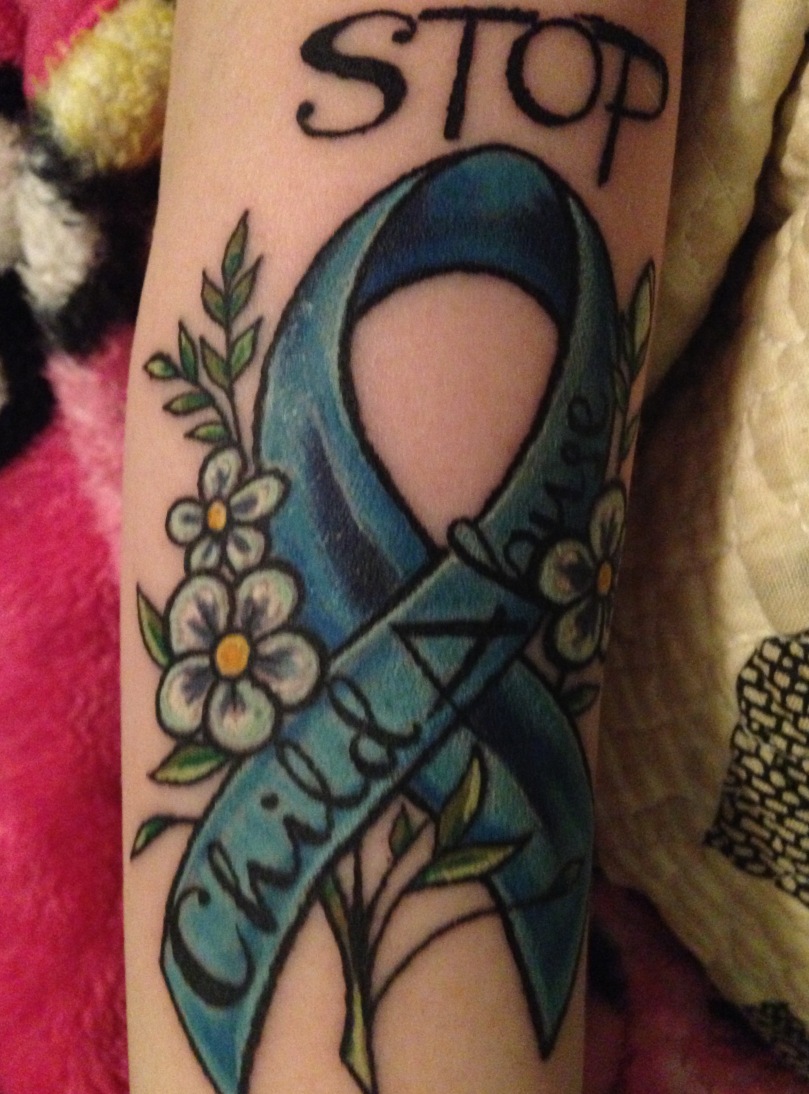
I am a child abuse survivor. I was physically, verbally, and emotionally abused by my dad and various other adults until I was 17 years old and finally told people that I was being abused. All abusers make their victims feel shame and guilt. One often thinks, “If only I did better,” or “It’s all my fault.” I still struggle with this and have recently learned of additional abusive behavior that I’ve continued to endure as an adult that I was either unaware of and/or denied it was real. Unfortunately, I continue to get confirmation that this abuse and manipulation is real and am putting a stop to it.
Mental illness runs in my family most likely due to the horrible cycle of abuse. Genes may also play a part in the mental illness of my family. My Adverse Childhood Experience (ACE) score is a 7, which is pretty high, and I struggle with anxiety, PTSD, and depression every day. But every day I work towards healing and helping people.
To not share my story and pain would be like not sharing something that, unfortunately, is a part of me. It would be like denying that I have severe cerebral palsy. While I don’t allow either of these things to define me, I have wounds and scars from my trauma and I believe in using my pain to help others—others who were abused, others who are trying to break the cycle with their own children, and others who need to know that we’re not alone in this. And if I can prevent one child from abuse and heartbreak from the people who are supposed to love them, then it’s all worth it.
Another reason I share my story is to show that there is hope even when it doesn’t always feel like it. Some days are harder than others for us survivors, but we are survivors. There is no shame in getting help professionally. There’s no shame in creating healthy relationships to support you. Abusers and their defenders will make you feel like a horrible person for opening up about your abuse but don’t let them win. This is typical abuser behavior. Unless the abuser gets help, nothing will ever change.
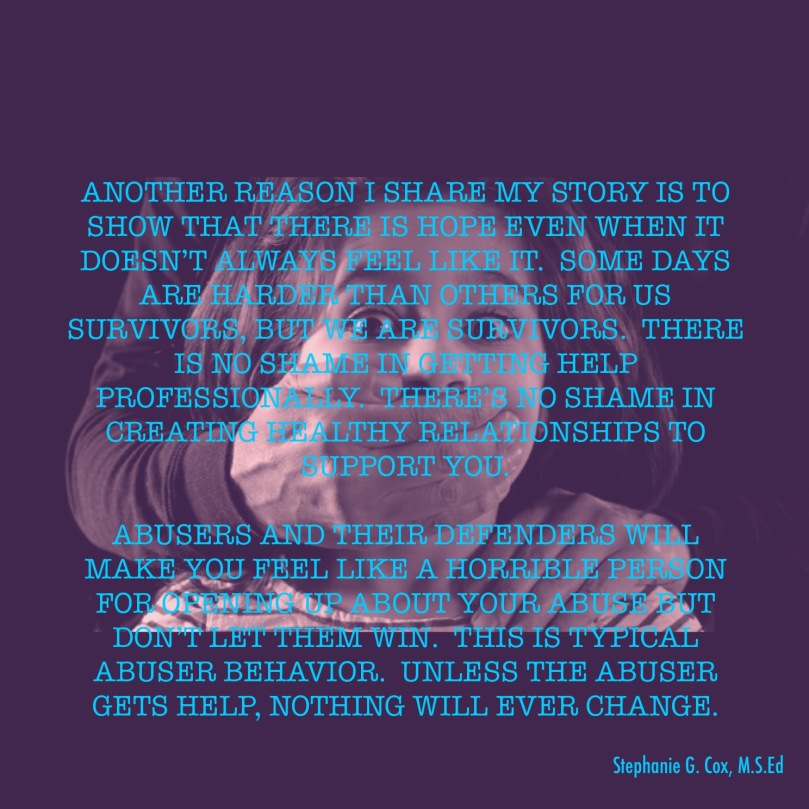
I hope also try to help people understand that even “normative spankings” are abuse in that corporal punishment can make children at a higher risk of being physically abused. When a parent spanks/hits a child and the child doesn’t obey, the parent may decide to spank/hit even harder. This is a risk for physical abuse even if one doesn’t consider corporal punishment as abuse. No child ever deserves to be hit.
And countless other studies show that corporal punishment is harmful to children and it often includes emotional and verbal abuse because the child is told how “bad” he/she is and how he/she “deserves the spanking.”
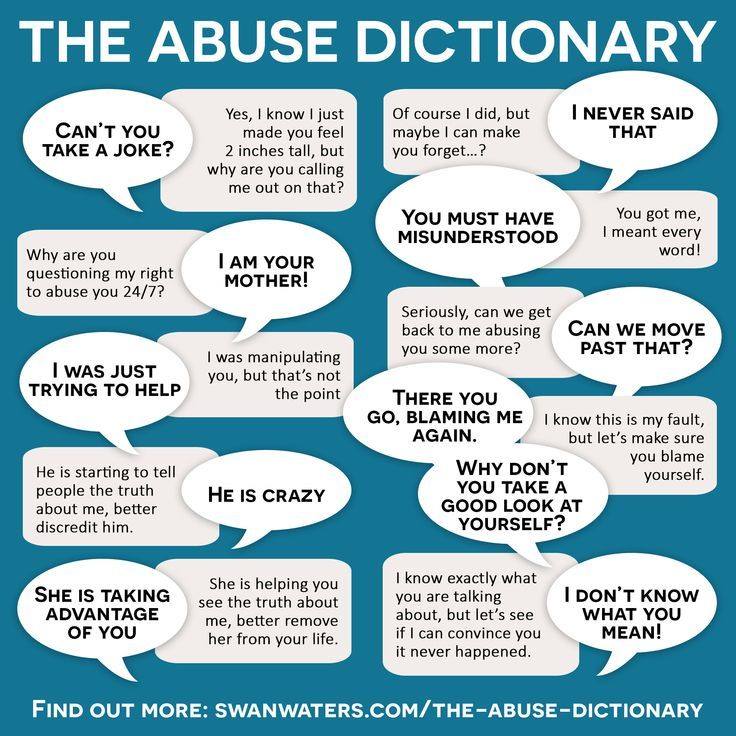
My dad hit me because of my spasms, which are involuntary muscle movements due to my severe cerebral palsy. He also hit me for other things. He was verbally and emotionally abusive as well. He passed away in 2003.
After extensively researching narcissism as well as conferring with a colleague that knows more about this mental illness than meI do, I now believe that both of my parents very likely had/have this disorder. In addition to refusing to admit they were/are wrong, they exhibited/exhibit other key characteristics of narcissism such as a lack of empathy, “an inflated sense of their own importance, a deep need for excessive attention and admiration, troubled relationships” (Mayo Clinic, 2019).
I have been over-analyzing my own behaviors because I am absolutely terrified of getting this mental illness. It’s important to realize that it’s human nature to occasionally be selfish and self-absorbed. It is also human nature to want recognition for accomplishments or to not to want to always admit when we are wrong. Sometimes, like children, we want our own way and lash out when we don’t get our way. This is not narcissistic as long as we recognize these tendencies and can admit that we do some of them occasionally. I know I do these things sometimes but I always admit it. I will always apologize if I am in the wrong.
To have Narcissistic Personality Disorder (NPD), one must exhibit at least 5 or more of these characteristics to an abnormal level and not be able to admit that he/she is doing any of this. People with NPD will deny that they have it and will make their victims believe that it’s the victims’ fault, not theirs. And as with any kind of illness, there is a spectrum wherein each individual lies. Some people have narcissistic tendencies and some have NPD. Unfortunately, because people with narcissistic tendencies or NPD will absolutely not seek help for this mental illness, it’s very difficult to diagnose. These people usually seek treatment for depression or anxiety but not narcissism (Bressert, 2019). In addition to this, NPD and other personality disorders can have the same kind of characteristics.
It has also been suggested that the stigma of mental illness can be associated with narcissism (Arikan, 2005, https://pdfs.semanticscholar.org/aadd/5cd265bcaeeaff77d9ce4fe16abf4ad39dc8.pdf).
I forgive my parents and other abusers and their defenders, but I cannot remain silent. This is now a part of my story and I will tell it in a respectful manner. Because people with NPD or narcissistic tendencies are masters at manipulation, one must put up strong boundaries and stand firm. Otherwise, through manipulation that isn’t always obvious, these people will break the boundaries. Walking away from them is the best way to protect oneself and hopefully get them to get help. But nothing is guaranteed with this mental illness.
One can and must forgive his/her abusers because the forgiveness is more about setting oneself free from harboring anger and resentment towards them. However, this does not mean letting the abusers off the hook. I can’t do this myself. Forgiveness also does not mean that you have to reconcile with them. It just means you are able to work through the pain and heal.
I also don’t believe that all abusers are narcissistic or have a mental illness. The cycle is so hard to break especially when the community is actually encouraging the abuse and the silence of the children and adults. I’m aware of many abusers and/or pro-spankers that have realized that they were wrong and have apologized for it. They change the way they parent or interact with their grown children. Change is possible!
I am learning how to not be in toxic relationships with people who continue to hurt me. This is far from easy but having healthy relationships is crucial for healing and recovery. Getting psychotherapy is a must. And I heal from getting tattoos so I recently got the tattoo below. It was very emotional for me but reminds me that I am a SURVIVOR! I need this on the days that feel impossible to get through.
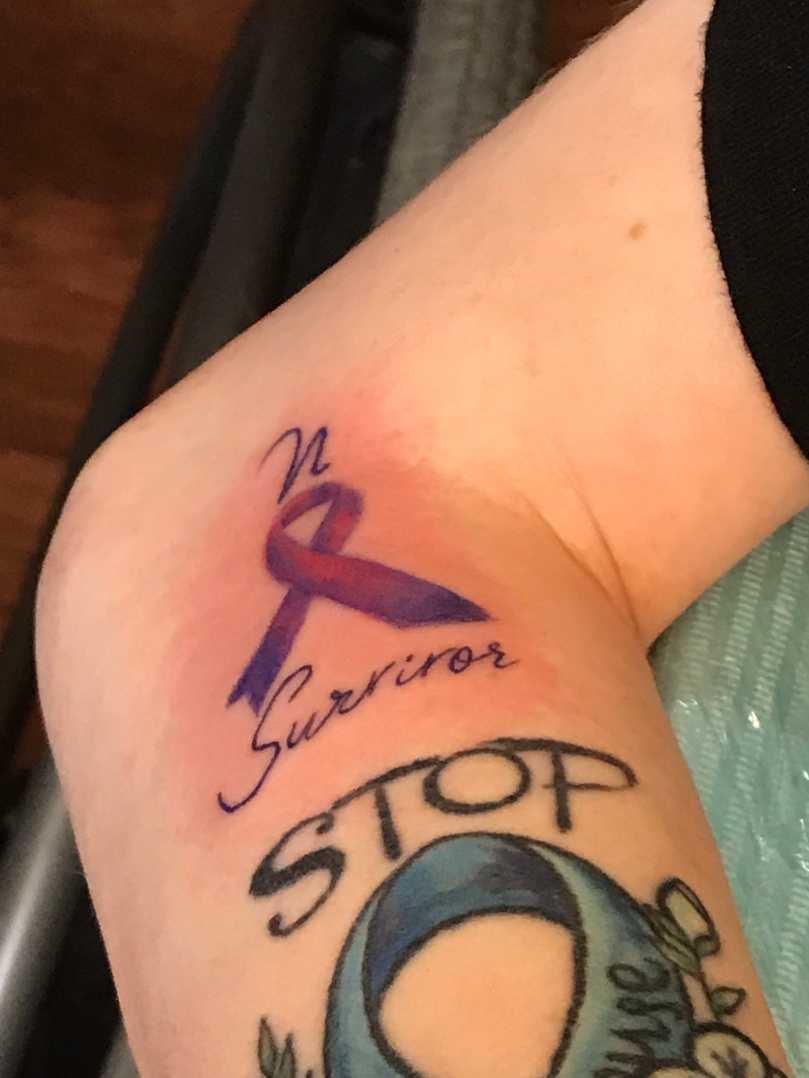
Gentle parenting is prevention for child abuse. If parents understand typical child development, then I believe that they are less likely to spank/hit or otherwise abuse their children. Therefore, I will never stop sharing my story. It is a part of my healing process. I don’t do it out of spite. I do it because I understand the pain and struggle after trauma and abuse.
May we value children and stop child abuse someday for good!
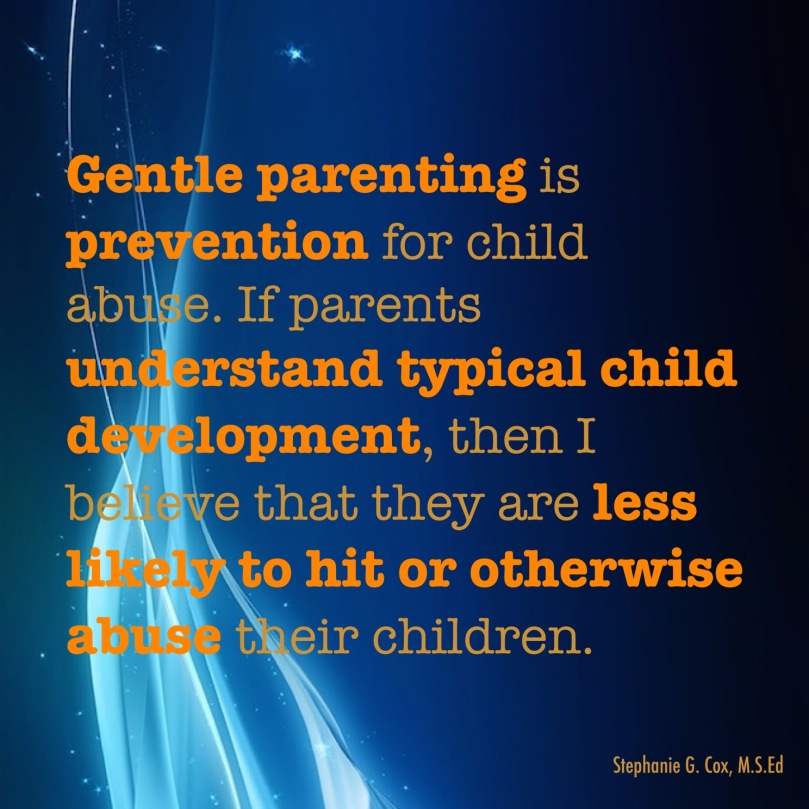
References:
Arikan, K. (2005). A Stigmatizing Attitude Towards Psychiatric Illness is Associated with Narcissistic Personality Traits. Psychiatry Relat Sci Vol 42 No. 4 pp. 248–250
Black, R. (2019). Personality Disorders: A Guide to the Ten Different Types. Retrieved https://www.psycom.net/personality-disorders-10-different-types/
Bressert, S. (2019). Narcissistic Personality Disorder. Retrieved from https://psychcentral.com/disorders/narcissistic-personality-disorder/
Goodtherapy. (2018). Adverse Childhood Experience (ACE). Retrieved from https://www.goodtherapy.org/blog/psychpedia/ace-questionnaire
Psychology Today. (2019). Narcissism. Retrieved from https://www.psychologytoday.com/us/basics/narcissism
Mayo Clinic. (2019). Narcissistic Personality Disorder. Retrieved from https://www.mayoclinic.org/diseases-conditions/narcissistic-personality-disorder/symptoms-causes/syc-20366662


[…] physically, mentally, emotionally, and verbally abused by my parents. As I have written in another blog post, I truly believe that both parents are/were narcissistic which is confusing because they did fight […]